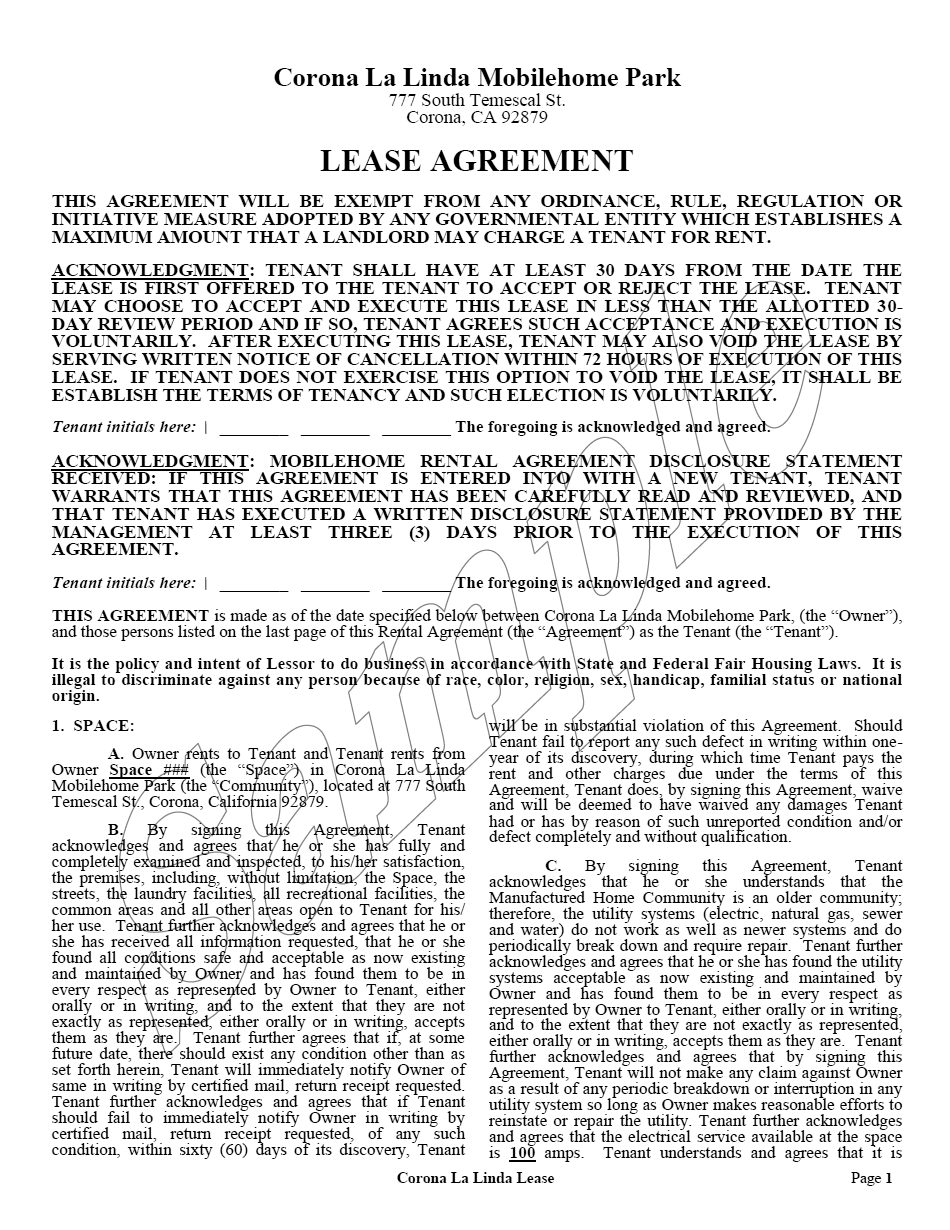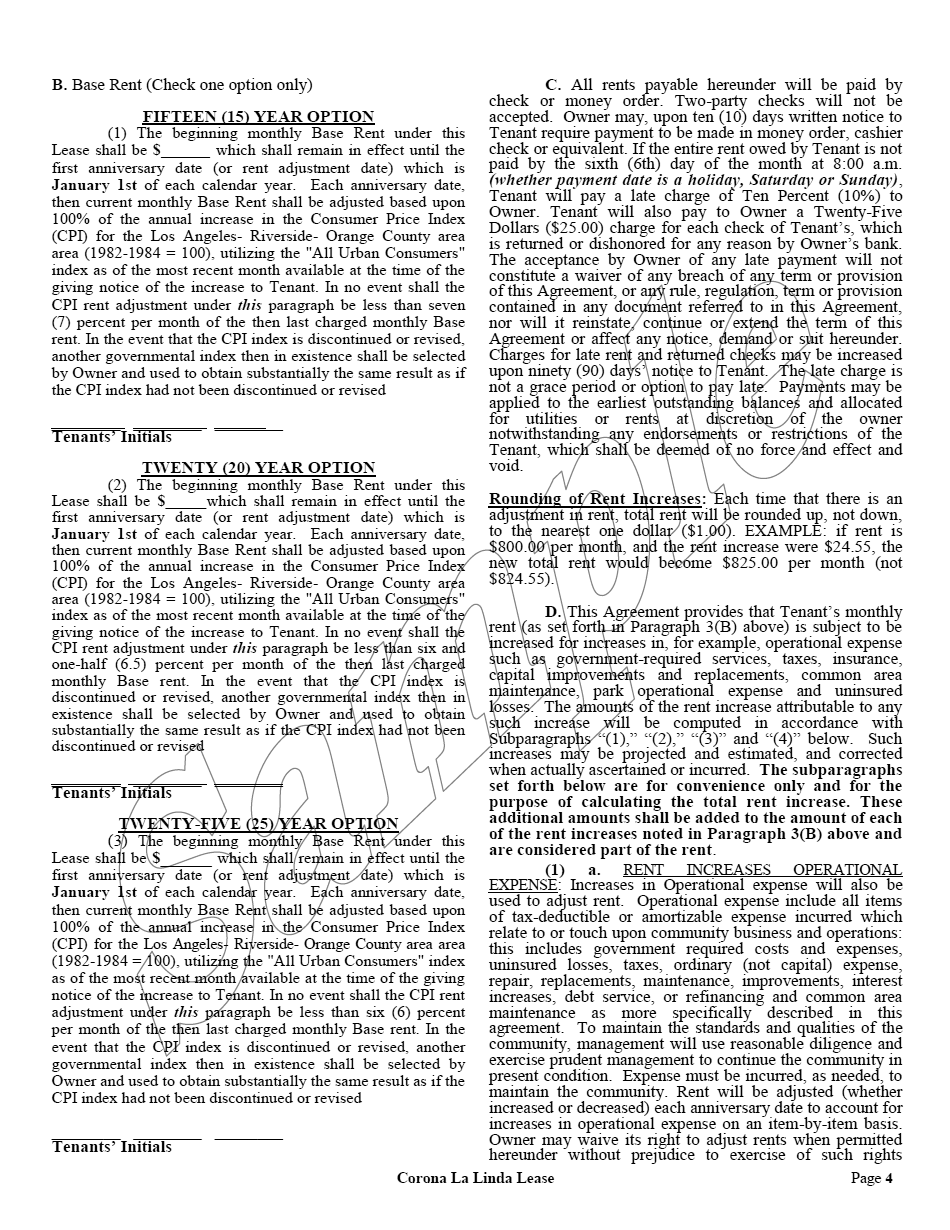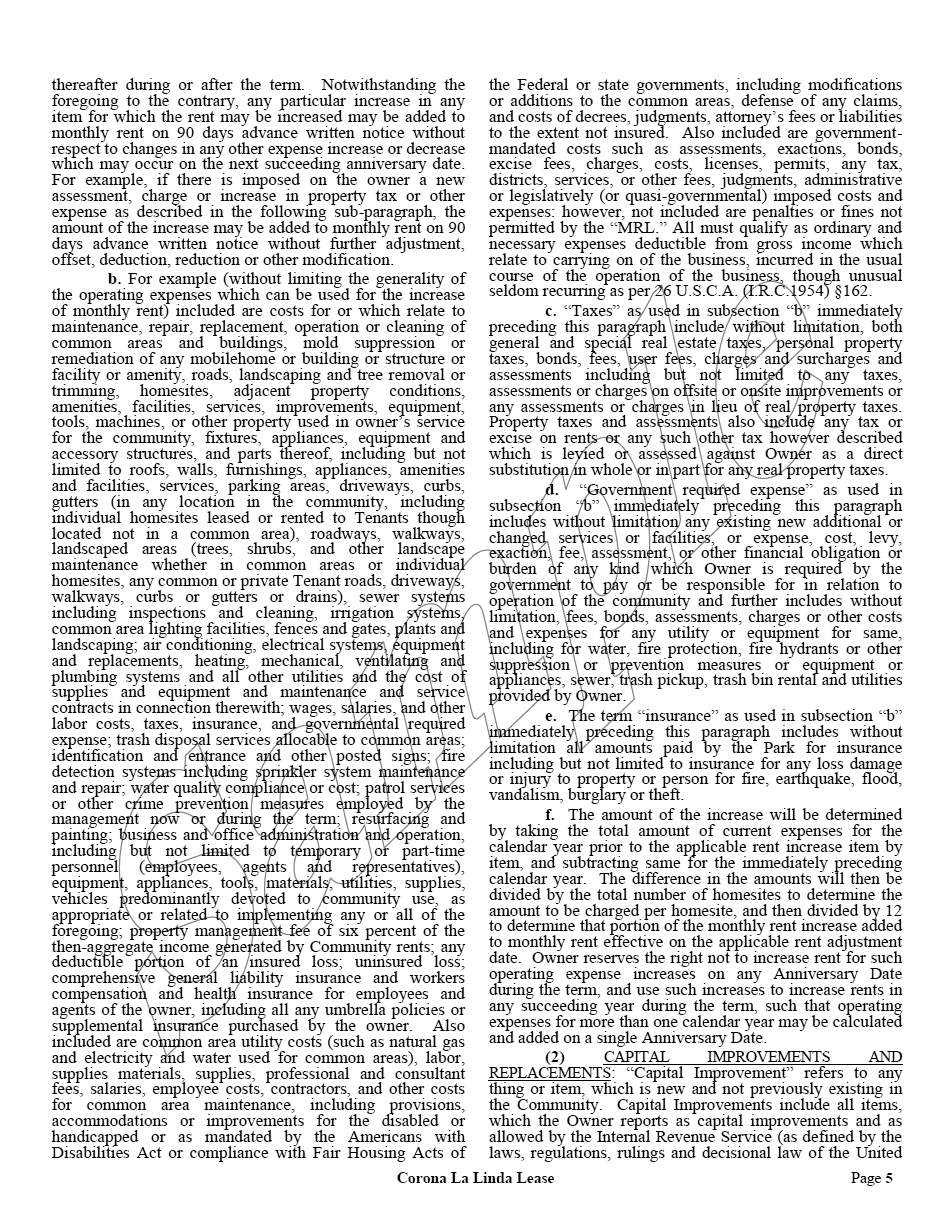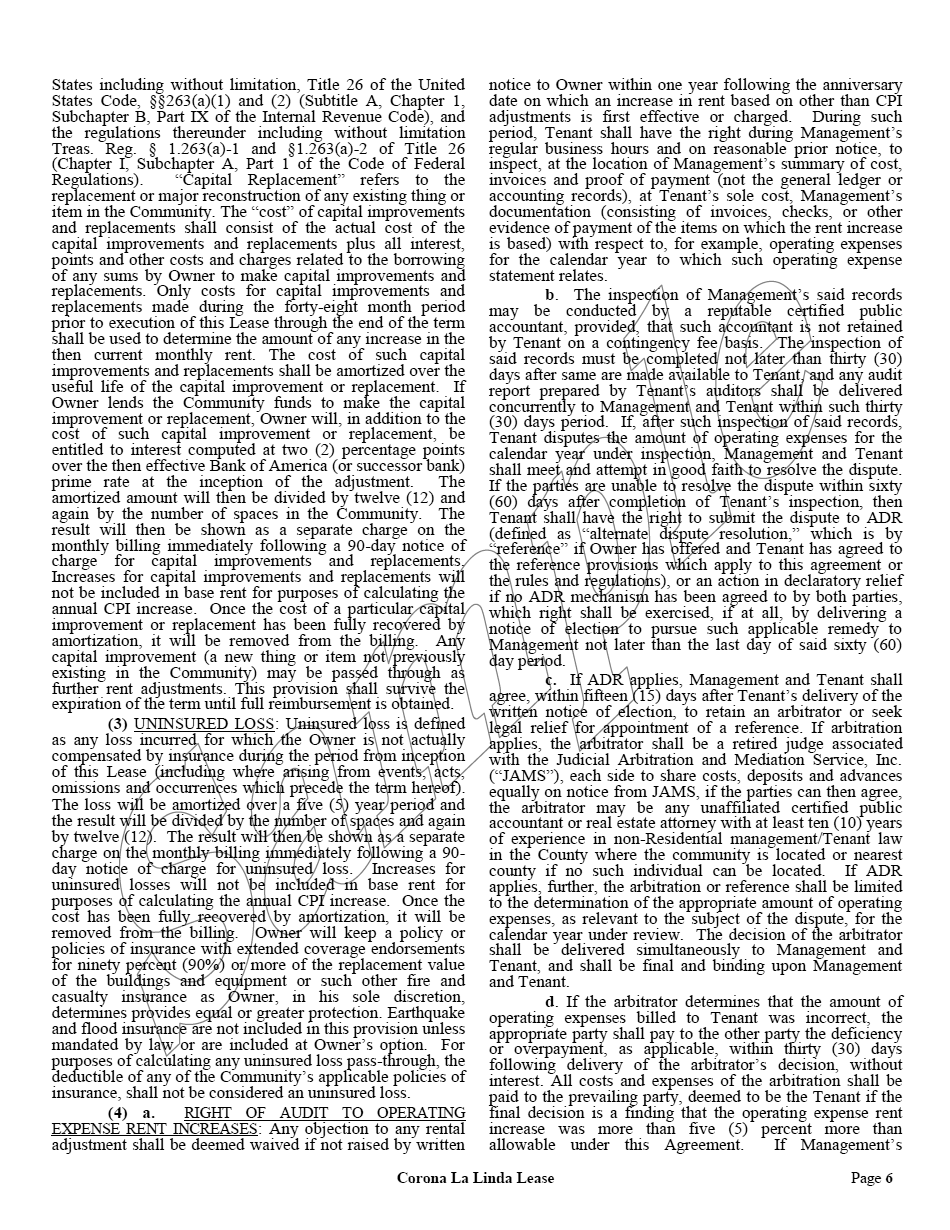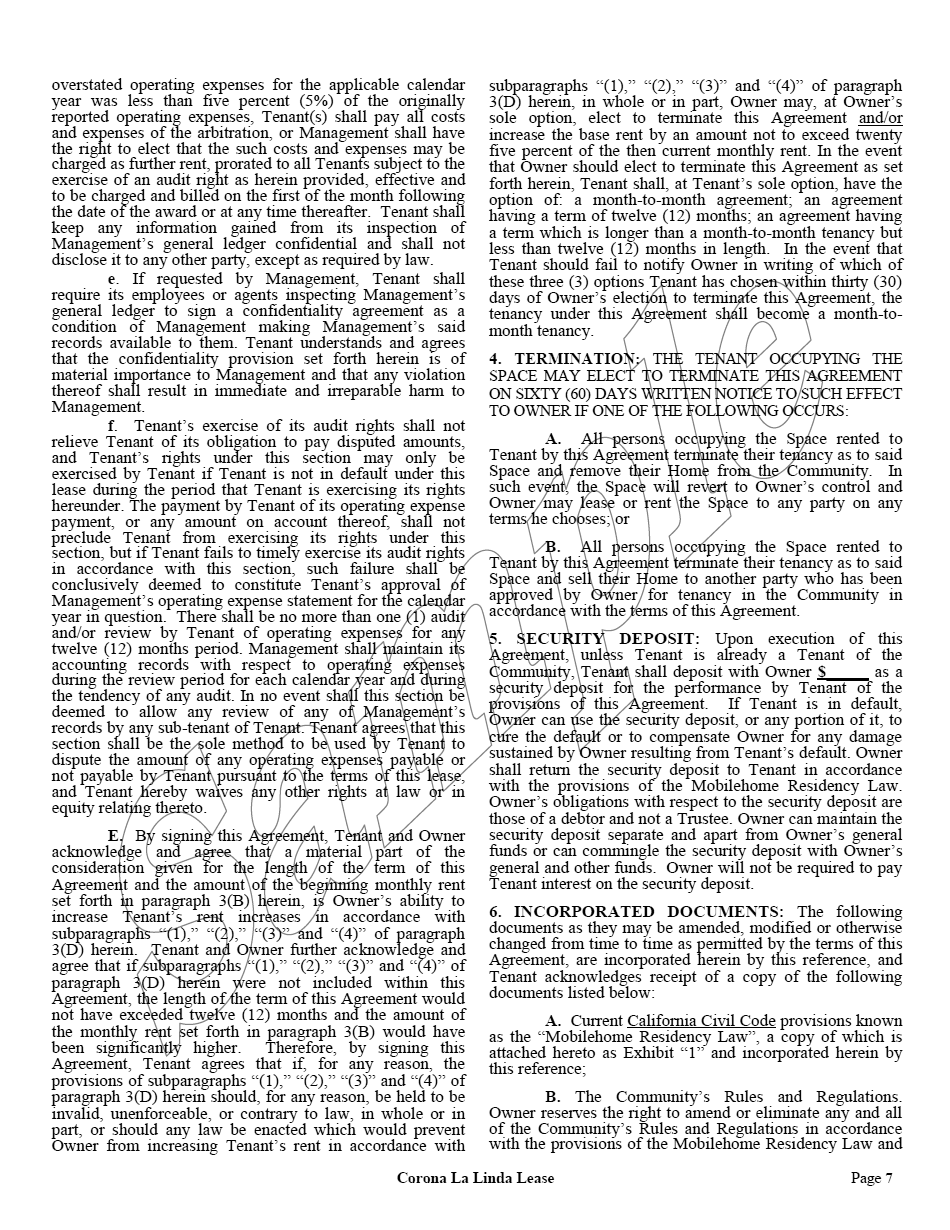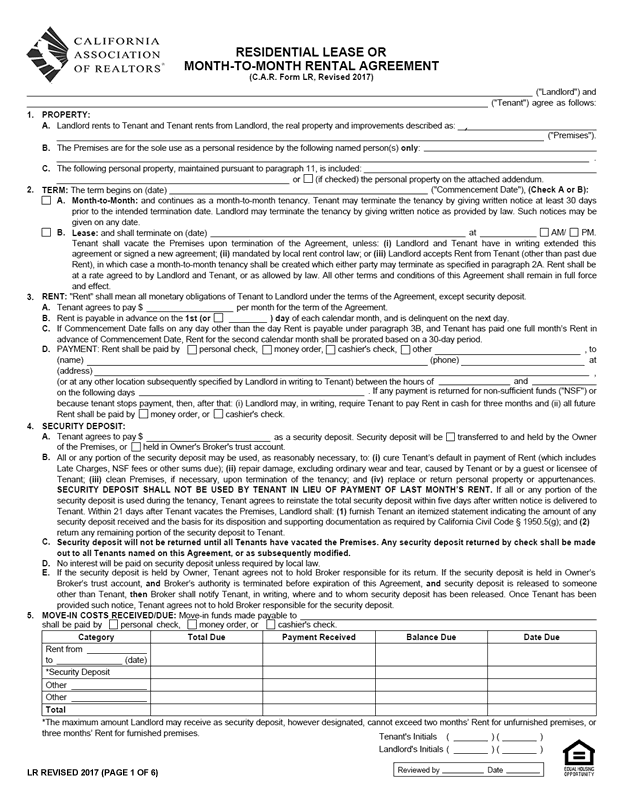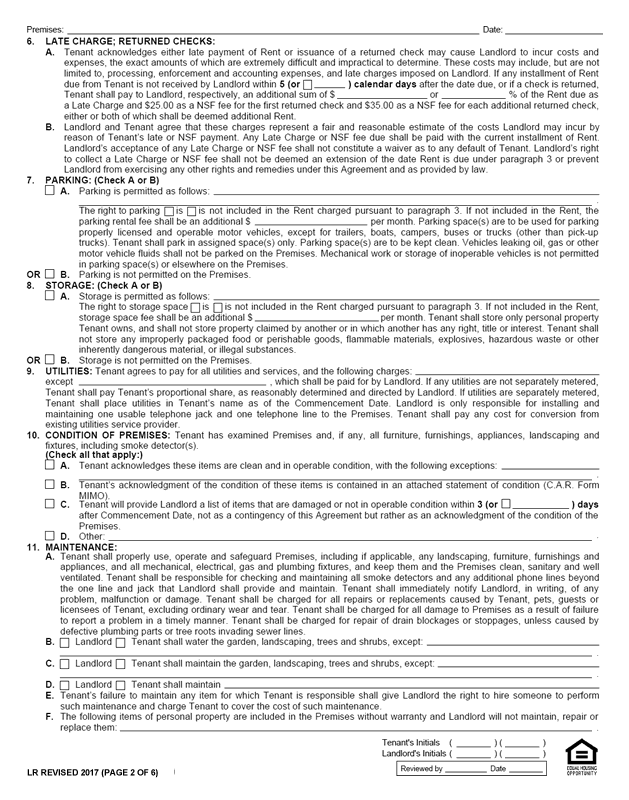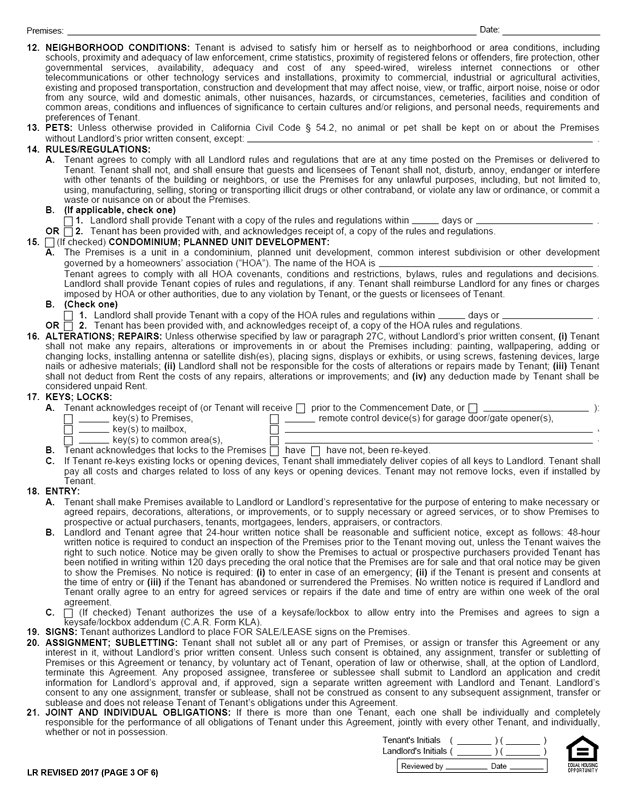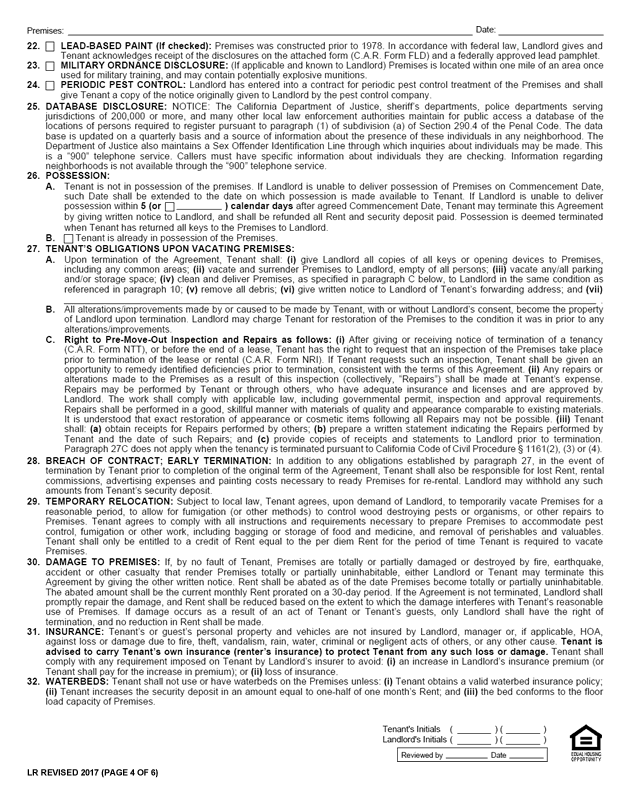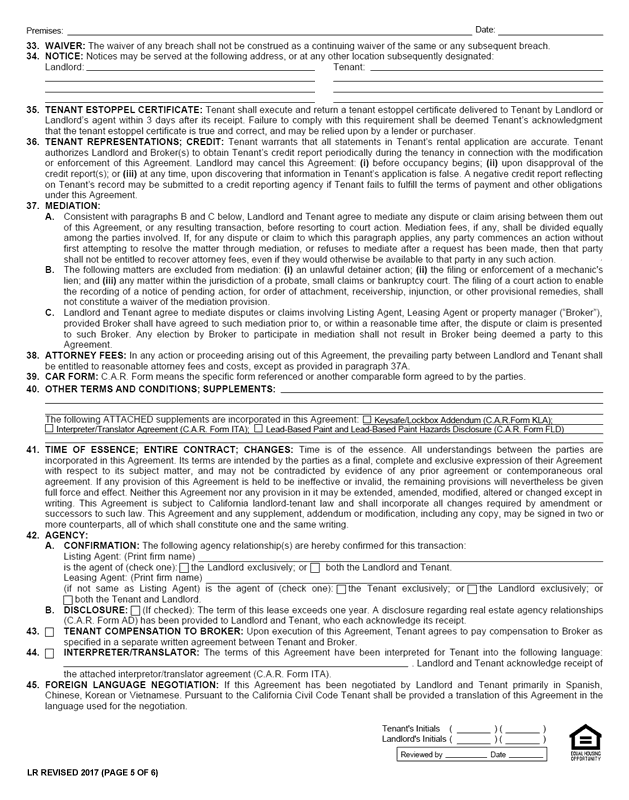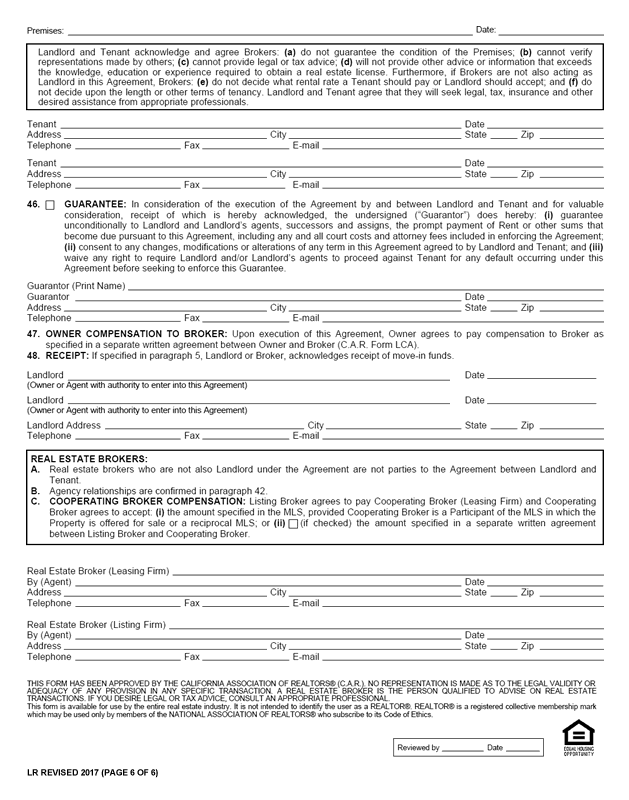Sierra Corporate Management A Kort & Scott Company
SCM Unconscionable Mobile Home Park Leases – Do Not Sign
DO NOT SIGN a Kort & Scott Financial Group (KSFG) dba Sierra Corporate Management (SCM) Lease Agreement until you have sought professional and/or legal advice. The MHPHOA believe the long-term lease agreements being offered by Kort & Scott Financial Group (KSFG) dba Sierra Corporate Management (SCM) are Unconscionable Contracts aka Unlawful Contracts. These leases are overly harsh, unduly oppressive, unreasonably favorable and so one-sided as to shock the public conscience.
Define: Unconscionability
Unconscionability is a doctrine in contract law that describes terms that are so extremely unjust, or overwhelmingly one-sided in favor of the party who has the superior bargaining power, that they are contrary to good conscience. Typically, an unconscionable contract is held to be unenforceable because no reasonable or informed person would otherwise agree to it. The perpetrator of the conduct is not allowed to benefit, because the consideration offered is lacking, or is so obviously inadequate, that to enforce the contract would be unfair to the party seeking to escape the contract.
Wikipedia – Unconscionability
Sierra Corporate Management – Long-Term Lease Agreement
Twenty-Five (25) Year Option
“B. (3) The beginning monthly Base Rent under this Lease shall be $ __________ which shall remain in effect until the first anniversary date (or rent adjustment date) which is January 1st of each calendar year. Each anniversary date, then current monthly Base Rent shall be adjusted based upon 100% of the annual increase in the Consumer Price Index (CPI) for the Los Angeles-Riverside-Orange County area (1982-1984 = 100), utilizing the “All Urban Consumers” index as of the most recent month available at the time of the giving notice of the increase to Tenant. In no event shall the CPI rent adjustment under this paragraph be less than six (6) percent per month of the then last charged monthly Base rent. In the event that the CPI index is discontinued or revised, another governmental index then in existence shall be selected by Owner and used to obtain substantially the same result as if the CPI index had not been discontinued or revised.”
“D. (1) (a). Rent Increases Operational Expense: Increases in Operational expense will also be used to adjust rent. Operational expense include all items of tax-deductible or amortizable expense incurred which relate to or touch upon community business and operations: this includes government required costs and expenses, uninsured losses, taxes, ordinary (not capital) expense, repair, replacements, maintenance, improvements, interest increases, debt service, or refinancing and common area maintenance as more specifically described in this agreement. To maintain the standards and qualities of the community, management will use reasonable diligence and exercise prudent management to continue the community in present condition. Expense must be incurred, as needed, to maintain the community. Rent will be adjusted (whether increased or decreased) each anniversary date to account for increases in operational expense on an item-by-item basis. Owner may waive its right to adjust rents when permitted hereunder without prejudice to exercise of such rights thereafter during or after the term. Notwithstanding the foregoing to the contrary, any particular increase in any item for which the rent may be increased may be added to monthly rent on 90 days advance written notice without respect to changes in any other expense increase or decrease which may occur on the next succeeding anniversary date. For example, if there is imposed on the owner a new assessment, charge or increase in property tax or other expense as described in the following sub-paragraph, the amount of the increase may be added to monthly rent on 90 days advance written notice without further adjustment, offset, deduction, reduction or other modification.”
Sierra Corporate Management Lease Agreement – Page 04 of 21
“D. (1) (b). For example (without limiting the generality of the operating expenses which can be used for the increase of monthly rent) included are costs for or which relate to maintenance, repair, replacement, operation or cleaning of common areas and buildings, mold suppression or remediation of any mobilehome or building or structure or facility or amenity, roads, landscaping and tree removal or trimming, homesites, adjacent property conditions, amenities, facilities, services, improvements, equipment, tools, machines, or other property used in owner’s service for the community, fixtures, appliances, equipment and accessory structures, and parts thereof, including but not limited to roofs, walls, furnishings, appliances, amenities and facilities, services, parking areas, driveways, curbs, gutters (in any location in the community, including individual homesites leased or rented to Tenants though located not in a common area), roadways, walkways, landscaped areas (trees, shrubs, and other landscape maintenance whether in common areas or individual homesites, any common or private Tenant roads, driveways, walkways, curbs or gutters or drains), sewer systems including inspections and cleaning, irrigation systems, common area lighting facilities, fences and gates, plants and landscaping; air conditioning, electrical systems, equipment and replacements, heating, mechanical, ventilating and plumbing systems and all other utilities and the cost of supplies and equipment and maintenance and service contracts in connection therewith; wages, salaries, and other labor costs, taxes, insurance, and governmental required expense; trash disposal services allocable to common areas; identification and entrance and other posted signs; fire detection systems including sprinkler system maintenance and repair; water quality compliance or cost; patrol services or other crime prevention measures employed by the management now or during the term; resurfacing and painting; business and office administration and operation, including but not limited to temporary or part-time personnel (employees, agents and representatives), equipment, appliances, tools, materials, utilities, supplies, vehicles predominantly devoted to community use, as appropriate or related to implementing any or all of the foregoing; property management fee of six percent of the then-aggregate income generated by Community rents; any deductible portion of an insured loss; uninsured loss; comprehensive general liability insurance and workers compensation and health insurance for employees and agents of the owner, including all any umbrella policies or supplemental insurance purchased by the owner. Also included are common area utility costs (such as natural gas and electricity and water used for common areas), labor, supplies materials, supplies, professional and consultant fees, salaries, employee costs, contractors, and other costs for common area maintenance, including provisions, accommodations or improvements for the disabled or handicapped or as mandated by the Americans with Disabilities Act or compliance with Fair Housing Acts of the Federal or state governments, including modifications or additions to the common areas, defense of any claims, and costs of decrees, judgments, attorney’s fees or liabilities to the extent not insured. Also included are government-mandated costs such as assessments, exactions, bonds, excise fees, charges, costs, licenses, permits, any tax, districts, services, or other fees, judgments, administrative or legislatively (or quasi-governmental) imposed costs and expenses: however, not included are penalties or fines not permitted by the “MRL.” All must qualify as ordinary and necessary expenses deductible from gross income which relate to carrying on of the business, incurred in the usual course of the operation of the business, though unusual seldom recurring as per 26 U.S.C.A. (I.R.C.1954) §162.”
Sierra Corporate Management Lease Agreement – Page 05 of 21
Shock the Public Conscience
Who would ever sign a long-term lease in a mobile home park? Why would anyone ever sign a 15, 20 or 25-year lease like that? There are no benefits for the mobile home owner.
Is that legal for Sierra Corporate Management to do that to the mobile home park residents?
How can Sierra Corporate Management strip away your homeowner rights like that?
Sierra Corporate Management have a minimum 6% annual compounding increase built into the 25-year lease. The tenants are liable for most of the park's operating costs and operational risks. This does not appear to be a residential lease. This appears to be a modified commercial triple net (NNN) lease that is egregiously one-sided in favor of the landlord. Don't sign this!
Sierra Corporate Management mobile home owners should never sign a lease like this. From a legal perspective, this 21 page (19,758 words) lease appears to be riddled with overly harsh, unduly oppressive and unreasonably favorable terms for the MHP owners. It appears to be one-sided and what I would argue is an Unconscionable Contract.
The signing of these long-term leases aids in the refinancing of a parks debt, as a major component of an appraisal of the parks value is based on its rental income potential over time. These long-term leases lock in guaranteed annual rental increases at a minimum of 6-8% for the leased spaces.
Applicable Terms and Definitions
- Unconscionable Contract: A contract which is so outrageous or immoral that it shocks the sensibilities of the courts.
- Unfair Surprise: Where the party who drafts the contract includes terms in the contract knowing that those terms are not in line with the other party’s expectations and that the other party will not notice that the terms have been inserted.
- Exculpatory Clauses: Clauses which release a party from liability for injuries that he causes either intentionally or by negligence.
- Limitations on Warranty Liability: Where a seller tries to limit certain implied warranties on goods he has sold.
- Adhesion Contract: A standard form contract drafted by one party (usually a business with stronger bargaining power) and signed by the weaker party (usually a consumer in need of goods or services), who must adhere to the contract and therefore does not have the power to negotiate or modify the terms of the contract.
Sierra Corporate Management – Sample Lease Agreement
Rent Increases Legalese – Pages 01, 04, 05, 06, 07 of 21
Civil Code §798.19
No Waiver of Chapter 2.5 Rights
No rental agreement for a mobilehome shall contain a provision by which the homeowner waives his or her rights under the provisions of Articles 1 to 8, inclusive, of this chapter. Any such waiver shall be deemed contrary to public policy and void.
California MRL
CLLMHP Lease Example
- File Type: PDF
- Pages: 21
- Size: 617KB
- Words: 19,758
- Characters 103,199 (NS)
- Characters 123,378 (WS)
- Paragraphs 433
- Lines 2,626
Commercial Lease vs. Residential Lease
The MHPHOA have not been able to locate an example of a Residential Lease Agreement that compares to the KSFG/SCM Mobile Home Park Lease Agreement. In fact, all of our research regarding the KSFG/SCM leases leads to commercial grade contracts referred to as NN (Double Net) or NNN (Triple Net) Leases. The NNN lease, often just called the “Triple Net Lease” is a popular lease structure in commercial real estate.
What is a Triple Net or NNN Lease?
A triple net (NNN) lease is defined as a lease structure where the tenant is responsible for paying all operating expenses associated with a property; Property Taxes, Insurance, Maintenance Costs. These three additional costs represent the nets to which the name of the lease refers. The triple net or NNN lease is considered a turnkey investment since the landlord is not responsible for paying any operating expenses.
What the NNN lease ultimately achieves is that it shifts the responsibility, and therefore the risk, of paying the operating expenses from the landlord to the tenant. For example, if property taxes increase one particular year at an unusually high rate, then the landlord’s bottom line cash flow will be protected under an NNN lease and the tenant will be the one responsible for bearing this increased expense.
Types of Net Leases
Single Net Lease (N Lease)
In this lease, the tenant pays base rent plus a pro-rata share of the building's property tax (meaning a portion of the total bill based on the proportion of total building space leased by the tenant); the landlord covers all other building expenses. The tenant also pays utilities and janitorial services.
Double Net Lease (NN Lease)
The tenant is responsible for base rent plus a pro-rata share of property taxes and property insurance. The landlord covers expenses for structural repairs and common area maintenance. The tenant once again is responsible for their own janitorial and utility expenses.
Triple Net Lease (NNN Lease)
This is the most popular type of net lease for commercial freestanding buildings and retail space. It is known as the net net net lease, or NNN lease, where the tenant pays all or part of the three "nets" – property taxes, insurance, and CAMS – on top of a base monthly rent. Common area utilities and operating expenses are usually lumped in as well; for example, the cost for staffing a lobby attendant would be part of the NNN fees. Of course, tenants also pay the costs of their own occupancy, including janitorial services, utilities, and their own insurance and taxes.
Landlords typically estimate expenses and charge tenants a portion of these expenses based on their proportionate, or pro-rata share. A tenant who leases 1,000 square feet of a 10,000 square foot building would be expected to pay 10% of the building's taxes, insurance, and CAMS, for example.
Triple net leases tend to be more landlord-friendly, and tenants should carefully review NNN fees and negotiate caps on the amounts they can be raised annually. An NNN lease can also fluctuate from month to month and year to year as operating expenses increase or decrease, making the company's expense forecasting tricky and sometimes frustrating.
There are tenant benefits in the NNN leases, however. Transparency is an excellent perk, since tenants can see business operating expenses in relation to what they are charged. Cost savings in operating expenses are passed on to the tenant rather to the landlord. In addition, the monthly rent in a NNN lease is potentially lower than in a gross lease, as tenants have a higher level of responsibility for the building.
Absolute Triple Net Lease
This is a less common option that is more rigid and binding than the NNN lease, where tenants carry every imaginable real estate risk, for example, being responsible for construction expenses to rebuild after a catastrophe, or for continuing to pay rent even after the building has been condemned. Aptly called the "hell-or-high-water lease," tenants have ultimate responsibility for the building no matter what.
Modified Gross Lease
As the gross lease is more tenant-friendly, and the net lease tends to be more landlord-friendly, there exists a compromise lease for the convenience of both parties. The modified gross lease (sometimes called the modified net lease) is similar to a gross lease in that the rent is requested in one lump sum, which can include any or all of the "nets" – property taxes, insurance, and CAMS. Utilities and janitorial services are typically excluded from the rent, and covered by the tenant. Tenants and landlords negotiate which "nets" are included in the base rental rate.
The modified gross lease is more popular with tenants, because its flexibility translates into an easier agreement between tenant and landlord. Unlike the NNN lease, if insurance, taxes or CAM charges increase, the lease rate would not change. Of course, if those expenses decrease, the cost savings is passed on to the landlord. As janitorial service and electricity are not covered, tenants can better control how much they spend compared to a gross lease.
42Floors – 3 Different Types of Commercial Real Estate Leases
NNN Lease Planning
NNN lease planning is a rich investment tool which provides the investor with many opportunities to navigate an ever changing market. NNN lease investments are essentially inflation protected bonds guaranteed by a credit tenant, rather than a state or local municipality. The tenant makes monthly payments to the landlord, while the real estate (and often rent bumps called for in the lease) provides the investor protection against inflation.
NNN lease investments provide similar tax advantages as tax-exempt municipal bonds, without forcing the investor to settle for lower yields or opening the investor up to a large capital gains hit. If an investor were to purchase a bond in the secondary market and turn around and sell it for a profit, years later, he would have to pay a capital gains tax on the profit, regardless of whether or not the bond is exempt from state income tax.
This is not the case when investing in NNN leases because of the fact that although structured like a bond, they are still considered real estate investments and therefore fall under the same tax laws as such which means that they can be depreciated in the same manner as similar income producing commercial real estate.
The taxes on the income they generate can be written off or deferred over the life of the asset. The investor of course has to pay said depreciation back when he sells, however this too can be circumvented by evoking a Starker’s 1031 exchange and trading into another like-kind property. NNN leased investments are also financeable allowing the investor to leverage the credit of their tenant and the interest payments would also be a writeoff.
NNN 1031 Exchange
In its simplest form, a 1031 exchange is a tax deferral strategy for real estate transactions in which a property owner or investor sells one property and purchases another within a specific time frame. The transaction does have to qualify as a “like kind” exchange.
Off-Market NNN Properties
An off-market NNN property is a NNN property that is available for sale, but not publicly marketed. Many investors and developers prefer off-market transactions for a variety of reasons, one of which is controlling the publicity of the availability of the property, which could create issues with other lease negotiations on other deals. There are several professional commercial real estate brokers that specialize in off-market NNN properties.
Wikipedia – NNN Lease
MHP Investment Highlights
Tremendous Tax Benefits – Accelerated Depreciation
From an accounting perspective, the majority of a mobile home park’s value is comprised of land improvements (roads and utility lines), which can be depreciated at an accelerated schedule. Mobile home park depreciation schedules typically average 15 years compared to apartments of 27.5 years and commercial properties of 39 years. This unique tax feature often translates to tax free operating cash flows to the mobile home park investment owner.
Civil Code References
Division 3. Obligations – Part 2. Contracts – Title 4. Unlawful Contracts
1667. That is not lawful which is:
- Contrary to an express provision of law;
- Contrary to the policy of express law, though not expressly prohibited; or,
- Otherwise contrary to good morals.
§1608. If any part of a single consideration for one or more objects, or of several considerations for a single object, is unlawful, the entire contract is void.
§1668. All contracts which have for their object, directly or indirectly, to exempt any one from responsibility for his own fraud, or willful injury to the person or property of another, or violation of law, whether willful or negligent, are against the policy of the law.
§1670.5(a). If the court as a matter of law finds the contract or any clause of the contract to have been unconscionable at the time it was made the court may refuse to enforce the contract, or it may enforce the remainder of the contract without the unconscionable clause, or it may so limit the application of any unconscionable clause as to avoid any unconscionable result.
§1670.8(a)(1). A contract or proposed contract for the sale or lease of consumer goods or services may not include a provision waiving the consumer's right to make any statement regarding the seller or lessor or its employees or agents, or concerning the goods or services.
§1670.8(a)(2). It shall be unlawful to threaten or to seek to enforce a provision made unlawful under this section, or to otherwise penalize a consumer for making any statement protected under this section.
§1670.8(b). Any waiver of the provisions of this section is contrary to public policy, and is void and unenforceable.
§1670.8(c). Any person who violates this section shall be subject to a civil penalty not to exceed two thousand five hundred dollars ($2,500) for the first violation, and five thousand dollars ($5,000) for the second and for each subsequent violation, to be assessed and collected in a civil action brought by the consumer, by the Attorney General, or by the district attorney or city attorney of the county or city in which the violation occurred. When collected, the civil penalty shall be payable, as appropriate, to the consumer or to the general fund of whichever governmental entity brought the action to assess the civil penalty.
§1670.8(d). In addition, for a willful, intentional, or reckless violation of this section, a consumer or public prosecutor may recover a civil penalty not to exceed ten thousand dollars ($10,000).

